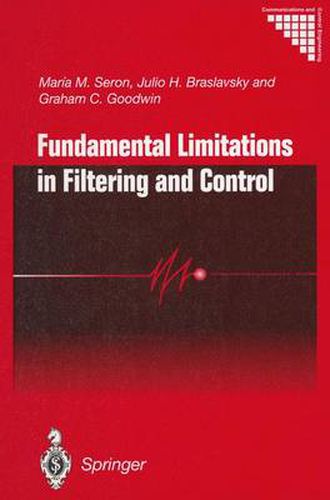Readings Newsletter
Become a Readings Member to make your shopping experience even easier.
Sign in or sign up for free!
You’re not far away from qualifying for FREE standard shipping within Australia
You’ve qualified for FREE standard shipping within Australia
The cart is loading…






This title is printed to order. This book may have been self-published. If so, we cannot guarantee the quality of the content. In the main most books will have gone through the editing process however some may not. We therefore suggest that you be aware of this before ordering this book. If in doubt check either the author or publisher’s details as we are unable to accept any returns unless they are faulty. Please contact us if you have any questions.
This book deals with the issue of fundamental limitations in filtering and control system design. This issue lies at the very heart of feedback theory since it reveals what is achievable, and conversely what is not achievable, in feedback systems. The subject has a rich history beginning with the seminal work of Bode during the 1940’s and as subsequently published in his well-known book Feedback Amplifier Design (Van Nostrand, 1945). An interesting fact is that, although Bode’s book is now fifty years old, it is still extensively quoted. This is supported by a science citation count which remains comparable with the best contemporary texts on control theory. Interpretations of Bode’s results in the context of control system design were provided by Horowitz in the 1960’s. For example, it has been shown that, for single-input single-output stable open-loop systems having rela tive degree greater than one, the integral of the logarithmic sensitivity with respect to frequency is zero. This result implies, among other things, that a reduction in sensitivity in one frequency band is necessarily accompa nied by an increase of sensitivity in other frequency bands. Although the original results were restricted to open-loop stable systems, they have been subsequently extended to open-loop unstable systems and systems having nonminimum phase zeros.
$9.00 standard shipping within Australia
FREE standard shipping within Australia for orders over $100.00
Express & International shipping calculated at checkout
This title is printed to order. This book may have been self-published. If so, we cannot guarantee the quality of the content. In the main most books will have gone through the editing process however some may not. We therefore suggest that you be aware of this before ordering this book. If in doubt check either the author or publisher’s details as we are unable to accept any returns unless they are faulty. Please contact us if you have any questions.
This book deals with the issue of fundamental limitations in filtering and control system design. This issue lies at the very heart of feedback theory since it reveals what is achievable, and conversely what is not achievable, in feedback systems. The subject has a rich history beginning with the seminal work of Bode during the 1940’s and as subsequently published in his well-known book Feedback Amplifier Design (Van Nostrand, 1945). An interesting fact is that, although Bode’s book is now fifty years old, it is still extensively quoted. This is supported by a science citation count which remains comparable with the best contemporary texts on control theory. Interpretations of Bode’s results in the context of control system design were provided by Horowitz in the 1960’s. For example, it has been shown that, for single-input single-output stable open-loop systems having rela tive degree greater than one, the integral of the logarithmic sensitivity with respect to frequency is zero. This result implies, among other things, that a reduction in sensitivity in one frequency band is necessarily accompa nied by an increase of sensitivity in other frequency bands. Although the original results were restricted to open-loop stable systems, they have been subsequently extended to open-loop unstable systems and systems having nonminimum phase zeros.